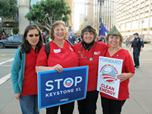Nurses and environmental activists from across the U.S. are joining hands this week to step up the message that there is still time to stop the Keystone XL Pipeline before it stops all of us.
Join us for a march across the Golden Bate Bridge in San Francisco Thursday, June 20, beginning with a noon rally at Battery East, near the Golden Gate Bridge Pavilion at Fort Point adjacent to the Bridge. (More details here.)
It’s an event that that will feature a land, sea and air protest that matches a triad of reasons to oppose the Keystone project – for health, economic, and, of course, environmental imperatives.
With massive pressure from the political and economic powerhouse fossil fuel industry mounting on the Obama administration to green-light KXL, the movement opposing the pipeline is also growing. Instead of a green light, they say, let’s have a green economy, as well as a safer environment and a healthier planet. Our planet, our health, nurses say.
Besides National Nurses United, the nation’s largest nurses’ union, participants and endorsers include 350.org, Friends of the Earth, the Sierra Club, CREDO, Greenpeace, and other environment and public health advocates.
For nurses, opposition to KXL starts with the health of our patients, our communities, and our families.
Climate change is a clear and present danger to public health. Carbon emissions are a major factor in intensifying climate change. Hazardous air pollutants emitted directly from coal-fired power plants have been linked to damage to the eyes and skin, impairment of neurological function and ability to learn, and pulmonary and cardiovascular disease. The EPA has determined that exposure to particulate matter is a cause of heart attacks, breathing problems and long-term respiratory illness including asthma, and reproductive, developmental, and cancer outcomes.
Higher air temperatures themselves can increase bacteria-related food poisoning, such as salmonella, and animal-borne diseases such as West Nile virus. Ground level ozone contaminants can damage lung tissue, reduce lung function, and increase respiratory ailments. Pakistani pediatricians recently said they are already witnessing a rise in vector-borne diseases including diarrhea, cholera, gastroenteritis, typhoid, and hepatitis due to environmental factors and the effects of climate change.
KXL would exacerbate this health emergency in a number of ways, prompting health concerns from the extraction, transport and refining of tar sands oil.
First, extraction of tar sands oil is far more difficult than conventional oil drilling. The massive amount of water needed to separate the extracted product, bitumen, from sand, oil and silt, is contaminated with toxic substances that when dumped infects clean water supplies. Communities living downstream from contaminated water have seen spikes in rates of rare cancers, renal failure, lupus, and hyperthyroidism. In one small community of just 1,200 residents, 100 have already died from cancer.
Second, leaks from the transmission of the heavy, corrosive tar sands, over America’s agricultural heartland over water aquifers, and rivers pose a major danger as evidenced recently by a major tar sands spill in Arkansas. Two months later, residents are still complaining of health problems and concerns about poisonous impacts on wildlife and the environment, reports the Natural Resources Defense Council. The rupture of a tar sands oil pipeline in Michigan in 2010 similarly caused widespread respiratory ailments and other health problems in communities adjacent to the spill.
Third, refining tar sands oil is dirtier than refining conventional oil and results in higher emissions of toxic sulfur dioxide and nitrous oxide. Pollutants from tar sands refineries are directly linked to heart and lung disease, asthma, cancer and other serious health risks, as well as emissions of sulfur dioxide and nitrous oxide which contribute to acid rain.
While the portrait of labor and environmentalists being at odds on KXL is a popular meme in some media corners, there are a growing number of unionists who are speaking out such as the Canadian union which represents thousands who actually work in the country’s tar sands operations.
Summing up their views succinctly, David Coles, president of the Communications, Energy and Paperworkers Union of Canada (CEP), said, “The Keystone XL is not good for the economy, it’s not good for the environment, it violates all kinds of First Nations rights.”
Yes, despite the illusory promises of thousands of jobs, the reality of long-term employment falls far short. Indeed, spending on renewal clean energy sources creates more than three times as many jobs as the same spending on fossil fuel production, says Robert Pollin, co-director of the Political Economic Research Institute at the University of Massachusetts Amherst.
Lastly, the somber reality of climate change by itself should inspire all of us to speak out against KXL.
NASA scientist James Hansen, a pioneer in climate research, has called the Keystone pipeline “the biggest carbon bomb on the planet.” Warming has already led to the loss of one-third of Arctic summer ice. Formerly rare super storms, like Hurricanes Katrina and Sandy and a recent Oklahoma storm called the “worst tornado in U.S. history,” have become far more common, as have major droughts and heat waves have produced devastating effects on food production and have caused tens of thousands of deaths.
Hansen says development of KXL could mean “game over” on climate change. But it’s not to late for all of us to act.
 Nurses Take Activism Beyond the Bedside Nurses and environmental activists from across the U.S. are joining hands this week to step up the message that there is still time to stop the Keystone XL Pipeline before it stops all of us.
Nurses Take Activism Beyond the Bedside Nurses and environmental activists from across the U.S. are joining hands this week to step up the message that there is still time to stop the Keystone XL Pipeline before it stops all of us.